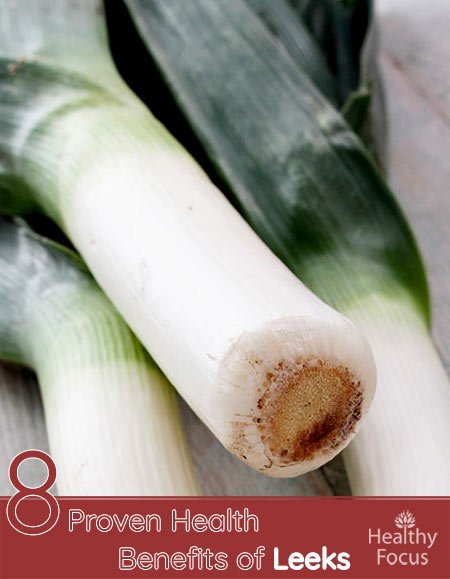Last Updated on February 18, 2019 by Marc Seward
I have always absolutely loved leeks. Being Welsh, there is something almost inevitable about that. I am not sure why, but the leek is one of the symbols of Wales along with dragons and daffodils.
As a child, we ate a lot of them and leeks were the base of my first ever home cooked recipe during my first year at university. Unfortunately, the result was disastrous…I remember it well…I used far too much lemon juice.
Fortunately, I managed to hone my cooking skills and I still use leeks in a lot of my recipes; I personally love them roasted but had never really given much thought to their health benefits until I was asked to research this article.
What are Leeks?
Leeks or Alium porrum to give them their scientific name are a long, green vegetable which belong to the same family as garlic, onions, chives and shallots. Unlike the other family members, leeks don’t form a bulb.
Not all of the vegetable that you see at the market is edible. The edible parts of the plant are the white base and the stem while the dark, green sheaths at the top can be discarded.
Leeks originated in the Middle East and the Mediterranean region. In much of Asia and Europe, people have been growing leeks as food for several thousand years.
They can be prepared and eaten in much the same way as people eat onions. You can consume them cooked in a variety of ways or enjoy them raw as part of a salad.
Their flavor is a fair bit milder than onions and I find them more suitable to many dishes including soups and casseroles especially for my children who find onions a bit too strong.
If you are not so familiar with leeks, I would recommend that you give them a go. They are a delicious and diverse vegetable. They are also extremely healthy and have numerous health benefits similar to those other , better known Alium family members like onions and garlic.
Leeks Nutritional Value
A 100 gram serving of leeks contains around 2 grams of dietary fiber and a gram of protein. The bulk of the vegetable is made up of water but they do contain several important minerals. These include vitamins A, C, E and B6 as well as calcium, iron, magnesium and manganese.
How Can Leeks Benefit Your Health?
As well as their nutritional content, leeks have natural antioxidant properties in the shape of polyphenols which can protect the body from cellular damage and help reduce the risk of numerous illnesses.
Many of the health benefits of leeks are linked to the presence of a compound called allicin which is also found in garlic, onions and shallots. Research has demonstrated that allicin has antibacterial, anti-fungal and anti-viral properties. It also produces a compound called sulfenic acid which can neutralize harmful free radicals quicker than any other known compound. (1)
As well as allicin, leeks contain a natural antioxidant flavonoid called kaemferol which is also present in leafy green vegetables like kale, broccoli and cabbage. Research into the health potential of kaempferol has been very promising.
It contains broad and potent health benefits and has also been linked with a reduced risk of various chronic diseases (2) including cancer. (3)
Various clinical studies have linked kaempferol with a diverse range of important therapeutic activities. These include antioxidant, antimicrobial, anti-inflammatory, cardio-protective and anti-diabetic properties.
And that is not all, kaempferol and some of its glycosides have analgesic, anti-allergy and anxiolytic activities.
Health Benefits of Leeks compared with Onions and Garlic
Leeks have not undergone anywhere near the same level of scientific research as onions or garlic but that certainly does not imply they are any less good for you. In fact, many experts believe that their health benefits compare favorably to their better known cousins in the allium family.
Numerous studies have told us that garlic has over 150 amazing health benefits. These range from reducing cholesterol, blood pressure to their anti-cancer benefits. Studies also demonstrate that onions have very similar far reaching therapeutic benefits especially when it comes to heart health.
Although there is far less scientific research into leeks, there is little reason to believe they may not have very similar beneficial properties. Given that leeks have a very high polyphenol content especially in terms of kaempferol, experts would expect an overlap in the therapeutic qualities of leeks, onions and garlic.
Health Benefits of Leeks
1. Heart Health
Numerous studies have demonstrated that vegetables belonging to the allium family can have a positive impact on blood pressure. Reducing blood pressure is very important to take the strain of the cardiovascular system and reducing the risk of stroke, heart disease, heart attack and atherosclerosis.
Another reason that leeks may protect your heart from future complications is that they may help reduce cholesterol levels in the blood.
2. Anti-Cancer
As a member of the allium family, leeks are a great source of the allyl sulfides that research has showed can combat various types of cancer. The cancers that allyl sulfide can help protect against include prostate, colon and stomach cancer.
3. Antibacterial
Garlic and onions have been well researched in terms of their antibacterial properties. Leeks contain the same compounds which make those other allium vegetables so effective in combating bacterial infection.
4. Digestive Health
Leeks are actually a natural source of prebiotics. Prebiotics are the good type of bacteria that thrive in the digestive tract. They contribute to a healthy digestive system and are play an important role in the absorption of nutrients.
Eating leeks can help keep the stomach’s bacterial environment in balance, help to eliminate toxins and stimulate digestive fluids. All of these factors contribute to a healthy digestive system and can help improve overall health.
5. Bone Health
Leeks can help keep your bones healthy and strong and reduce the risk of developing conditions like osteoporosis. They contain a good amount of calcium as well as magnesium both of which are vital to ensuring bone health.
6. Blood Booster
leeks contain a good amount of iron which help prevent anemia and similar conditions. Symptoms of anemia stemming from iron deficiency include fatigue, headaches and general weakness. Leeks are also a good source of vitamin C which helps the body to absorb iron better.
7. For Pregnant Women
Pregnant women and their unborn child can benefit a great deal from eating leeks. The vegetable contains a high level of folate acid as well as many other nutritional compounds like niacin and thiamin that can help women during pregnancy.
Folate in particular can reduce help prevent a newborn child from certain neural defects.
8. Antioxidant Properties
Leeks are a terrific source of antioxidants even when you compare them against other high antioxidant foodstuff. As an example, leeks have a polyphenol content pf 33 mgs per 100 grams of fresh leek.
Carrots have around 10 mgs and red peppers around 25. increasing your antioxidant consumption by eating leeks can have a major impact on your health and ability to stave off disease.
Adding Leeks into Your Life
Leeks are absolutely delicious, easy to prepare and can be cooked in a variety of ways in a range of recipes. When buying fresh leeks from the market, look for dark green leaves and a white neck as opposed to yellow.
To prepare your leek, cut off the greens at the top and dispose of the root and outer leaves. Wash the edible part of the leek and slice to your preferred thickness. They are delicious sautéed in olive oil and garlic or added to soups, stews and salads.
(1) http://onlinelibrary.wiley.com/doi/10.1002/anie.200804560/abstract
(2) https://www.ncbi.nlm.nih.gov/pubmed/21428901
(3) http://www.sciencedirect.com/science/article/pii/S0308814612019176

Leave a Reply
You must be logged in to post a comment.